In a transformative move, the Government of India has revamped its flagship SMILE scheme (Support for Marginalised Individuals for Livelihood and Enterprise), shifting from a punitive model to a comprehensive rehabilitation and reintegration programme for beggars. With a total budget of ₹100 crore over three years, this updated initiative now focuses on empowering India’s most vulnerable citizens, ensuring dignity, self-reliance, and structured support for long-term development.
Reasi Set to Implement SMILE Scheme – A Big Step for J&K
In a significant step towards ensuring a life of dignity for marginalised individuals, Reasi is poised to become the second district in Jammu and Kashmir, after Srinagar, to implement the SMILE scheme. This marks a notable expansion of the programme in the Union Territory, aiming to rehabilitate the homeless and destitute while promoting inclusive social development.
This move aligns with the Centre’s vision to make the scheme functional in regions that witness higher concentrations of urban poverty and street begging, especially in pilgrimage towns and tourist hubs like those in J&K.
Here’s all you need to know about the updated scheme and what it brings to districts like Reasi.
What is the Revised SMILE Scheme?
The revised SMILE scheme introduces a rights-based and rehabilitative framework. It no longer views beggary as a criminal issue but addresses it as a social challenge, aiming to restore dignity, provide shelter, offer skills training, and create pathways to employment.
With an annual allocation growing from ₹30 crore in FY 2023–24 to ₹37 crore in FY 2025–26, this centrally sponsored scheme underscores the government’s commitment to inclusive social welfare.
Four-Pronged Strategy for Sustainable Rehabilitation
To ensure targeted intervention and measurable results, the scheme follows a four-stage approach:
- Survey and Identification
District administrations and urban bodies will profile individuals based on age, gender, legal status, and health through comprehensive surveys. - Outreach and Mobilisation
Field-level teams will conduct spot counselling and engage individuals for voluntary mobilisation to shelter homes. - Rescue and Shelter
Individuals will be shifted to shelter homes, either under existing DAY-NULM facilities or rented spaces, with adequate infrastructure and staffing. - Comprehensive Resettlement
Long-term rehabilitation is promoted through education, skill-building, employment linkages, healthcare access, and integration into welfare schemes.
Focus Areas: Religious, Historic, and Tourist Locations
The SMILE scheme is being implemented in urban centers, especially in pilgrimage sites, religious towns, heritage zones, and tourist hotspots. The government recognises these areas as high-density begging zones and aims to tackle the issue at its root.
Religious trusts and shrine boards have been invited to actively participate in implementing the scheme at pilgrimage locations, enhancing local ownership and coordination.
Funding and Implementation Breakdown
The ₹100 crore allocation for three years is split as follows:
- ₹30 crore for FY 2023–24
- ₹33 crore for FY 2024–25
- ₹37 crore for FY 2025–26
Funds will be released in a three-phase structure:
- 30% for survey and mobilisation
- 50% for shelter and rehabilitation
- 20% post-verification of reintegration success
Each shelter home, with a capacity of at least 50 beneficiaries, receives an annual operational grant of ₹48.7 lakh, covering:
- Food and hygiene
- Bedding and clothing
- Toilets and sanitation
- Recreational and wellness activities like yoga
- Staffing and professional counselling
The maximum stay at a shelter is six months, extendable for disabled individuals or those with family dependencies.
Education and Skill Development: The Road to Self-Reliance
Recognising that rehabilitation requires empowerment, SMILE integrates educational and vocational training pathways:
- Children will be enrolled in government schools under Samagra Shiksha Abhiyan, with additional support for homework and tuition.
- Adults will receive job-oriented training in sectors like domestic help, security services, vending, and hospitality through PM-DAKSH, DAY-NULM, and other recognised programs.
- Disabled individuals, elderly persons, and those with health conditions will be linked to Ayushman Bharat, PM Jan Arogya Yojana, and old-age or de-addiction homes as required.
Monitoring, Transparency, and Accountability
To ensure the scheme’s success and transparency, the following mechanisms are in place:
- National SMILE Portal under the Ministry of Social Justice and Empowerment will host real-time beneficiary data.
- Urban Local Bodies (ULBs) and District Administrations will monitor implementation and partner with eligible NGOs and service agencies.
- Social audits, third-party evaluations, and mandatory field updates will be used to track outcomes and plug loopholes.
Rehabilitation Goals and Targets
The government has set ambitious yet achievable targets:
- 2,500 individuals to be rehabilitated in Year 1
- 6,000 individuals in Year 2
- 8,000 individuals in Year 3
These numbers reflect a scalable model with a focus on quality reintegration, rather than just temporary shelter.
The revised SMILE scheme is a beacon of hope for India’s urban poor, especially those trapped in the cycle of begging, exploitation, and exclusion. With a strong focus on dignity, livelihood, healthcare, and education, this programme stands as a transformative step toward inclusive development.
With Reasi joining Srinagar as the second district in Jammu and Kashmir to implement the scheme, it signals a growing commitment to uplift the marginalised and ensure that no one is left behind.
Channelling compassion into action, the SMILE scheme embodies India’s mission for a more humane and equitable society.
















